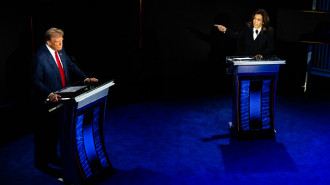US-backed forces push closer to IS 'capital' Raqqa
The US-backed Kurdish-Arab alliance pushed closer to Syria's Raqqa on Monday, while Iraqi forces recaptured a key town near Mosul, as offensives against the two Islamic State group strongholds continued to advance.
The Syrian Democratic Forces (SDF) alliance confirmed it had moved south towards the city despite fierce resistance from militants.
The alliance's forces had advanced on two fronts towards Raqqa amid heavy fighting, SDF spokeswoman Jihan Sheikh Ahmed told AFP, including at least 10 kilometres (six miles) south towards the city from the towns of Ain Issa and Suluk, she said.
In both cases the SDF was still some distance from Raqqa - on the Ain Issa front at least 30 kilometres (20 miles) away.
"The offensive is going according to plan," said Ahmed, adding that the SDF had captured at least 10 villages.
Despite this, Islamic State militants continued to fight back by sending suicide bombers in explosives-packed vehicles against advancing forces, an SDF commander said.
"IS is sending car bombers but coalition planes and our anti-tank weapons are limiting their effectiveness," the commander said, speaking on condition of anonymity.
After taking Abu Ilaj north of Raqqa, SDF fighters dug trenches and piled sandbags at the entrance to the village.
"In every area that we advance we are digging trenches with tractors and bulldozers to protect the front line, to prevent the jihadists from getting in and to stop car bombs," one fighter said.
The SDF says some 30,000 of its fighters are taking part in operation "Wrath of the Euphrates" which aims to surround and isolate IS inside Raqqa before assaulting the city itself.
Officials have warned that the battle is likely to be long and difficult.
"As in Mosul, the fight will not be easy and there is hard work ahead," US Defence Secretary Ashton Carter said.
"But it is necessary to end the fiction of ISIL's caliphate and disrupt the group's ability to carry out terror attacks against the United States, our allies and our partners," Carter said, using an alternative name for IS.
 |
The Mosul offensive has advanced faster than expected, but the battle for Raqqa is more complicated. |  |
Meanwhile in south of Mosul, Iraqi forces retook Hamam al-Alil from IS, a key objective in their three-week advance on the city.
Fighting also continued east of Mosul, with Kurdish forces advancing into the town of Bashiqa and the elite Counter Terrorism Service battling IS in the city's suburbs.
"Up to seven neighbourhoods are under the control of counter-terrorism forces, and they are now completely securing them and clearing them of pockets of terrorists present inside the houses," CTS spokesman Sabah al-Noman told AFP.
A peshmerga statement said late Monday its forces were in Bashiqa and had "begun house-to-house clearances".
Raqqa and Mosul are the last major cities in Syria and Iraq under the militants' control.
Their capture would deal a knockout blow to the self-styled "caliphate" IS declared in mid-2014.
The US-led coalition that launched operations against IS two years ago is providing crucial backing to the offensives, with air strikes and special forces advisers on the ground.
Driving IS from both cities has been the endgame since the US-led coalition launched air strikes against it in summer 2014, shortly after the jihadists seized large parts of Syria and Iraq.
The SDF said the alliance had received new weapons from the coalition for the Raqqa battle, including anti-tank missiles.
Another SDF source said 50 US military advisers would be involved in the operation, particularly to guide air strikes.
The SDF have agreed with the US that no Turkish troops or its allies will be involved in the operation, despite the presence of Syrian rebels backed by Ankara close by.
The Mosul offensive has advanced faster than expected, but the battle for Raqqa is more complicated.
Unlike in Iraq where the coalition has a state-controlled ally in federal forces, in Syria its ground partner is comprised of local militias, including some rebel groups that have battled President Bashar al-Assad's regime.
The domination of the SDF by the Kurdish People's Protection Units (YPG) has also raised deep concerns in Turkey, which considers the YPG a "terrorist" group linked to the outlawed Kurdistan Workers' Party (PKK).
Aid groups have voiced concerns for civilians trapped in both Mosul and Raqqa, warning they may be used as human shields.
More than 34,000 people have been displaced since the Mosul operation began on October 17, the International Organization for Migration said on Monday.
A US government official put the number at "just over 33,000 people".
More than a million people are believed to be in Mosul.
Raqqa had a population of some 240,000 before 2011 but more than 80,000 people have since fled there from other parts of Syria.

![Palestinians mourned the victims of an Israeli strike on Deir al-Balah [Getty]](/sites/default/files/styles/image_684x385/public/2024-11/GettyImages-2182362043.jpg?h=199d8c1f&itok=xSHZFbmc)


![The law could be enforced against teachers without prior notice [Getty]](/sites/default/files/styles/image_684x385/public/2178740715.jpeg?h=a5f2f23a&itok=hnqrCS4x)
 Follow the Middle East's top stories in English at The New Arab on Google News
Follow the Middle East's top stories in English at The New Arab on Google News

![Voters in Michigan [Getty]](/sites/default/files/styles/image_330x185/public/2182490468.jpeg?h=a5f2f23a&itok=XMi_sWGX)
